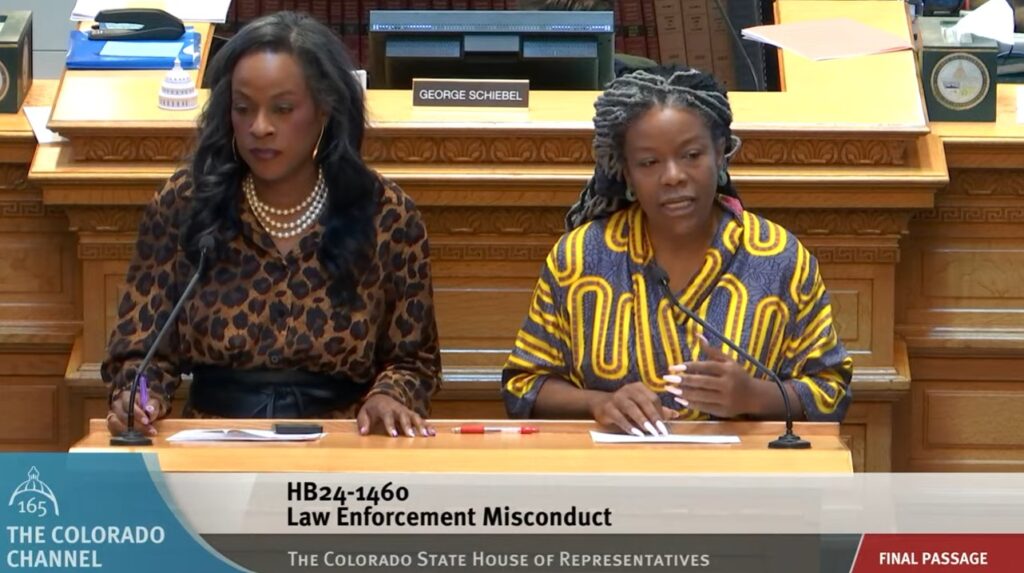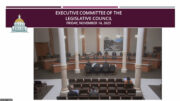By Jeffrey A. Roberts
CFOIC Executive Director
A proposal to ban the charging of fees for unedited body-worn camera footage, released to the public under the 2020 Law Enforcement Integrity Act, died Friday when the Colorado House amended and then defeated a controversial whistleblower bill.
Facing criticism from both Republican and Democratic representatives, the sponsors of House Bill 24-1460 tried to pass a stripped-down version of their measure that only included the creation of a law enforcement whistleblower working group. The strike-below amendment — without the body-cam footage provision — passed, but then the bill went down on a 31-33 vote.

Language in the bill as approved by the House Judiciary Committee last month addressed demands by the Boulder Police Department and some other agencies for hundreds or thousands of dollars before providing video of incidents in which there is a complaint of officer misconduct.
A lawsuit filed in April by Yellow Scene Magazine challenges the Boulder PD’s insistence that the news organization pay the agency nearly $3,000 to get footage of officers shooting and killing a 51-year-old woman last December. While the Colorado Criminal Justice Records Act (CCJRA) permits the charging of fees for the search, retrieval and redaction of criminal justice records “pursuant to part 3” of the statute, lawyers for Yellow Scene point out that the magazine’s request was made pursuant to C.R.S. § 24-31-902(2)(a), which has no fee provision.
If HB 24-1460 as introduced had become law, it would have been clear that agencies could not charge fees “related to the unedited video and audio recordings of an incident,” notwithstanding fee provisions in CCJRA and the Colorado Open Records Act.
“It’s got to stop. We must release the footage,” said the bill’s co-prime sponsor, Rep. Leslie Herod, D-Denver, during floor debate Thursday.
The body-cam provision was just one portion of a bill aimed at protecting law enforcement whistleblowers. Several police and sheriff’s officials testified against HB 24-1460, many complaining they weren’t included in the stakeholder process before the bill’s introduction on Apr. 17. Lawmakers from both parties said they thought the measure needed more time and deliberation, noting that the legislative session ends next week.
“We’re trying to make really important policy on the fly here,” Rep. Shannon Bird, D-Westminster, said Friday.
The House committee version of the bill also would have clarified that the footage-release requirements in the Law Enforcement Integrity Act apply to officer-involved shootings as well as “incidents in which there is a complaint of peace officer misconduct.” The Colorado Freedom of Information Coalition asked for the clarification after documenting three recent instances in which agencies denied journalists’ requests for body-cam footage of officer-involved shootings because there had been no official complaint of misconduct. Disclosure would be “contrary to the public interest” under CCJRA, the agencies determined.
That is how law enforcement agencies could treat all police body-cam and dashboard-camera footage prior to the enactment of Senate Bill 20-217 and follow-up provisions in House Bill 21-1250.
Under the 2020 law, all unedited video and audio recordings of incidents “in which there is a complaint of peace officer misconduct … through notice to the law enforcement agency involved in the alleged misconduct” must be released to the public no later than 21 days after a request is made. An agency can delay the release of video until 45 days from the date of an allegation of misconduct if the video “would substantially interfere with or jeopardize an active or ongoing investigation.”
Follow the Colorado Freedom of Information Coalition on X (formerly Twitter) @CoFOIC. Like CFOIC’s Facebook page. Do you appreciate the information and resources provided by CFOIC? Please consider making a tax-deductible donation.




